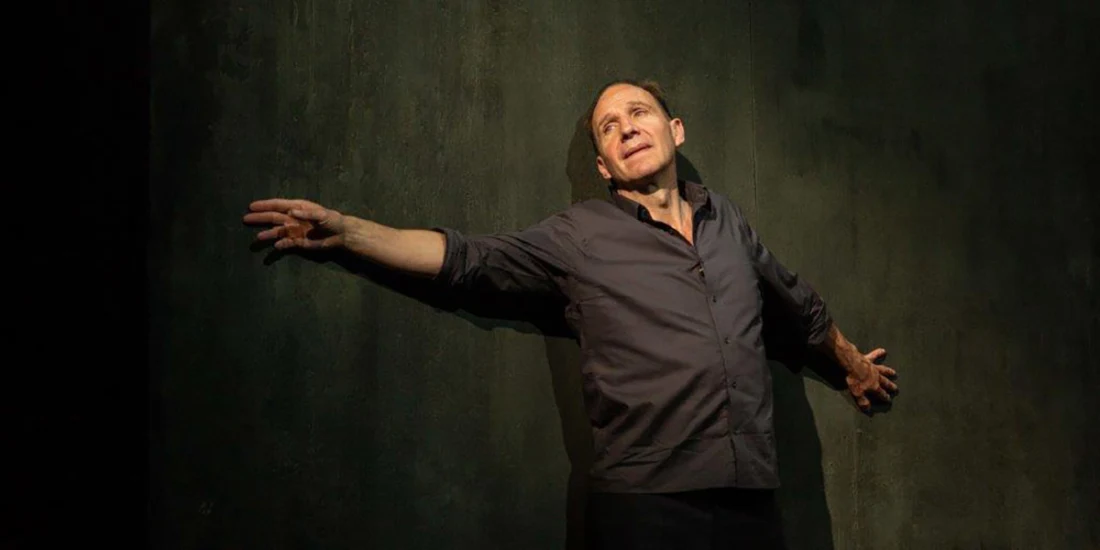'Four Quartets' review — Ralph Fiennes gives a relevant and moving performance of TS Eliot poetry
TS Eliot's dense, sprawling, four-poem cycle exploring time, faith, mortality, history, love, and everything in between doesn't exactly scream commercial theatre. And yet, thanks to a simply phenomenal performance by Ralph Fiennes, this passion project - which he toured earlier in the year - becomes an unlikely new West End gem. In an Eliot-worthy paradox, it's both challenging and serene, a whirlwind of ideas yet giving us the profundity of space, of silence.
Written between 1935 and 1941, the work is indelibly marked by the Second World War, and heard now in this 75-minute tour-de-force recitation, there are striking parallels with our Covid experience. In particular, there's the sense that time has taken on some new form, idling during lockdown and yet barrelling through a lost year, past crashing into future, and our present, that gift of survival, suddenly so palpable and precious.
The form of the poems echoes that musing, looping back around to the same ideas and phrases, such as "In my beginning is my end," or riffing off motifs like fire, dancing, stone, or sea - but each time with a new framing. The trick is not to try to impose a linear progression but to go with the flow, as Fiennes's inviting performance beckons you to do. He adds a jokiness to Eliot's knowing commentary, like "That was a way of putting it - not very satisfactorily," or asking "Shall I say it again?" When the latter drew a "Yes!" from an audience member, he looked delighted.
Fiennes, who also directs, beautifully honours the spirit of the text, which poses questions rather than forcing answers. He wants us to ponder these existential notions together, and his performance is dedicated to illuminating Eliot's ideas without stamping an interpretative authority upon them. It's a selfless act of transposition.
The production is bare bones, just two chairs and a desk, and Fiennes's physical choices are spare and thoughtful - from a wistful little dance to stamping into the earth. But it's mainly extraordinary vocal work. He rolls some words around his mouth as if to reach every flavour of them, he sings out like a hymn, or he dramatises the text, as when Eliot writes about the death of earth and Fiennes seems to speak through soil.
The trouble is that it's hard not to step outside the experience, too, in sheer admiration for the skill on display. Although Fiennes doesn't call attention to himself - he treads unobtrusively in bare feet - this is such a remarkable feat that you can't help responding to it. That might be why one section that plunges us into darkness works so well: the language suddenly takes centre stage. Fiennes has recorded an audio version of this too, and it does make the case for that form over the staging. Yet there's something about being in the space together that feels incredibly special: this act of communion.
It's fascinating how some lines sound so contemporary, like Eliot's writing about the strange moment when a Tube train stops between stations, and of course the loss and grief have particular resonance. But I actually found it reassuring to hear everything placed in this wider mystical context: a sense that there's something so much bigger than all of us, and that there is a natural rhythm to mortality which we shouldn't fear.
Hildegard Bechtler's design features two giant monoliths which Fiennes can rotate - but, appropriately for this cyclical piece, the view basically remains the same even though something's changed. Christopher Shutt's primal sound design features waves crashing and children's voices, and there's also a neat trick with a vintage microphone, while Tim Lutkin's gorgeous lighting shifts with every changing mood, whether a soft dimness, a sudden celestial shaft, or a fiery red glow.
This isn't a show where you can sit back and let the entertainment come to you; it's one that leaves room for you to find your own reading. But, if you do make that connection, it's a powerful meditation. And there's hope in there too, jostling with the apocalyptic images. Eliot quotes Julian of Norwich with a kind of joyful reverence: "All shall be well, and all manner of things shall be well."
Four Quartets is at the Harold Pinter Theatre. Book Four Quartets tickets on London Theatre.
Photo credit: Ralph Fiennes (Photo by Matt Humphrey)
Originally published on
